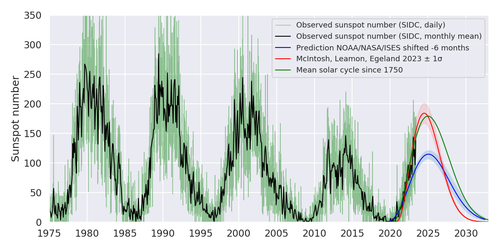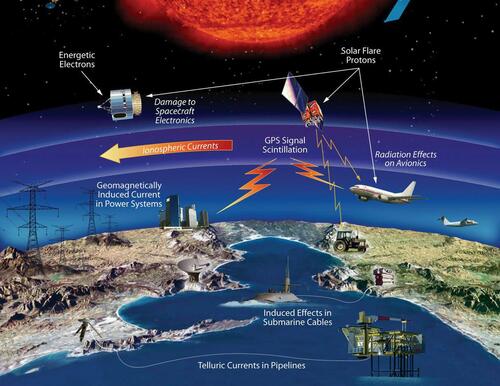
A new study, based on the analysis of growth rings in ancient trees, suggests that the most powerful solar storm on record slammed into Earth approximately 14,300 years ago. Should a storm of that intensity strike today, modern society would instantly collapse.
Researchers from the Collège de France, CEREGE, IMBE, Aix-Marseille University, and the University of Leeds published the new study in the Royal Society A journal. They measured radiocarbon levels in ancient trees preserved within the eroded banks of the Drouzet River near Gap, in the Southern French Alps, and found "tree trunks, which are subfossils – remains whose fossilization process is not complete – were sliced into tiny single tree-rings. Analysis of these individual rings identified an unprecedented spike in radiocarbon levels occurring precisely 14,300 years ago."
They said, "By comparing this radiocarbon spike with measurements of beryllium, a chemical element found in Greenland ice cores, the team proposes that the spike was caused by a massive solar storm that would have ejected huge volumes of energetic particles into Earth's atmosphere."
"Radiocarbon is constantly being produced in the upper atmosphere through a chain of reactions initiated by cosmic rays." Edouard Bard, lead author of the study, said in a statement.
Bard said, "Recently, scientists have found that extreme solar events including solar flares and coronal mass ejections can also create short-term bursts of energetic particles which are preserved as huge spikes in radiocarbon production occurring over the course of just a single year."
The researchers warned if "similar massive solar storms" slammed into Earth today, it would be "catastrophic for modern technological society, potentially wiping out telecommunications, satellite systems and electricity grids."
The study's co-author, Tim Heaton, a radiocarbon expert at the University of Leeds in England, explained, "Extreme solar storms could have huge impacts on Earth. Such super storms could permanently damage the transformers in our electricity grids, resulting in huge and widespread blackouts lasting months. They could also result in permanent damage to the satellites that we all rely on for navigation and telecommunication, leaving them unusable. They would also create severe radiation risks to astronauts."
Researchers said nine extreme solar storms - known as Miyake Events - have been identified over the last 15,000 years. The last known major solar storm fried telegraph machines in 1859 - has been called the "Carrington Event."
Solar Cycle 25 has been underway since April 2019 and might peak sometime in 2025. In December 2022, the total number of sunspots was at its highest in eight years, indicating solar activity has ramped up. Earlier this year, scientists observed twice as many sunspots -- red flags that solar maximum could be nearing.
Readers have been well-informed about what an 'X-class' flare could do to modern society:
- The Next Big Geomagnetic Storm Poses An Astronomical Risk To Modern Man
- Digital Economy Disruption Possible As "Terminator Event" Suggests Strongest Sunspot Cycle On Record Imminent
Forget the climate change narrative pushed by corporate media. Focus on how to protect the grid from major solar storms...
The world needs to prepare for the next big solar storm. Remember, in 2016, former President Obama signed an executive order titled "Coordinating Efforts to Prepare the Nation for Space Weather Events."
A new study, based on the analysis of growth rings in ancient trees, suggests that the most powerful solar storm on record slammed into Earth approximately 14,300 years ago. Should a storm of that intensity strike today, modern society would instantly collapse.
Researchers from the Collège de France, CEREGE, IMBE, Aix-Marseille University, and the University of Leeds published the new study in the Royal Society A journal. They measured radiocarbon levels in ancient trees preserved within the eroded banks of the Drouzet River near Gap, in the Southern French Alps, and found “tree trunks, which are subfossils – remains whose fossilization process is not complete – were sliced into tiny single tree-rings. Analysis of these individual rings identified an unprecedented spike in radiocarbon levels occurring precisely 14,300 years ago.”
They said, “By comparing this radiocarbon spike with measurements of beryllium, a chemical element found in Greenland ice cores, the team proposes that the spike was caused by a massive solar storm that would have ejected huge volumes of energetic particles into Earth’s atmosphere.”
“Radiocarbon is constantly being produced in the upper atmosphere through a chain of reactions initiated by cosmic rays.” Edouard Bard, lead author of the study, said in a statement.
Bard said, “Recently, scientists have found that extreme solar events including solar flares and coronal mass ejections can also create short-term bursts of energetic particles which are preserved as huge spikes in radiocarbon production occurring over the course of just a single year.”
The researchers warned if “similar massive solar storms” slammed into Earth today, it would be “catastrophic for modern technological society, potentially wiping out telecommunications, satellite systems and electricity grids.”
The study’s co-author, Tim Heaton, a radiocarbon expert at the University of Leeds in England, explained, “Extreme solar storms could have huge impacts on Earth. Such super storms could permanently damage the transformers in our electricity grids, resulting in huge and widespread blackouts lasting months. They could also result in permanent damage to the satellites that we all rely on for navigation and telecommunication, leaving them unusable. They would also create severe radiation risks to astronauts.”
Researchers said nine extreme solar storms – known as Miyake Events – have been identified over the last 15,000 years. The last known major solar storm fried telegraph machines in 1859 – has been called the “Carrington Event.”
Solar Cycle 25 has been underway since April 2019 and might peak sometime in 2025. In December 2022, the total number of sunspots was at its highest in eight years, indicating solar activity has ramped up. Earlier this year, scientists observed twice as many sunspots — red flags that solar maximum could be nearing.
Readers have been well-informed about what an ‘X-class’ flare could do to modern society:
Forget the climate change narrative pushed by corporate media. Focus on how to protect the grid from major solar storms…
The world needs to prepare for the next big solar storm. Remember, in 2016, former President Obama signed an executive order titled “Coordinating Efforts to Prepare the Nation for Space Weather Events.”
Loading…






